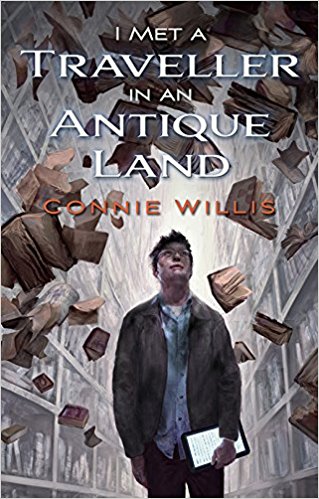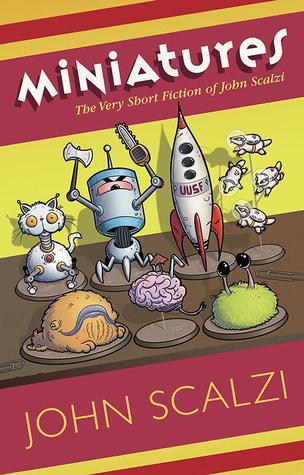 I Met a Traveller in an Antique Land by Connie Willis
I Met a Traveller in an Antique Land by Connie Willis Format: eARC
Source: supplied by publisher via NetGalley
Formats available: hardcover, ebook
Genres: books and reading, fantasy, science fiction
Pages: 88
Published by Subterranean Press on April 30, 2018
Purchasing Info: Author's Website, Publisher's Website, Amazon, Barnes & Noble, Kobo, Bookshop.org
Goodreads
Jim is in New York City at Christmastime shopping a book based on his blog—Gone for Good—premised on the fact that “being nostalgic for things that have disappeared is ridiculous.” Progress decides for people what they need and what’s obsolete. It’s that simple. Of course, not everyone agrees. After Jim bombs a contentious interview with a radio host who defends the sacred technology of the printed, tangible book, he gets caught in a rainstorm only to find himself with no place to take refuge other than a quaint, old-fashioned bookshop.
Ozymandias Books is not just any store. Jim wanders intrigued through stacks of tomes he doesn’t quite recognize the titles of, none with prices. Here he discovers a mysteriously pristine, seemingly endless wonderland of books—where even he gets nostalgic for his childhood favorite. And, yes, the overwhelmed and busy clerk showing him around says they have a copy. But it’s only after Jim leaves that he understands the true nature of Ozymandias and how tragic it is that some things may be gone forever…
From beloved, multiple-award-winning, New York Times best-selling author Connie Willis comes I Met a Traveller in an Antique Land, a novella about the irreplaceable magic of books.
My Review:
If you love books, this is a terrific story.
Although the blurbs say it’s all about the magic of books, and it is about that, it feels as if it is also, and possibly first and foremost, a book about obsession. And nostalgia. And obsolescence. And definitely books.
I say that it is about obsession because of the main characters reaction to his discovery of and at the strange and mysterious Ozymandias Books.
The name of the bookstore, Ozymandias, probably sounds familiar, but you probably couldn’t place it unless you googled it, as I did. Ozymandias is the title of a poem by Percy Bysshe Shelley, which begins with the line, “I met a traveller from an antique land”.
Ironically, the theme of the poem is hubris, overweening pride, that comes before an inevitable fall. In the case of the poem, it references the inevitable fall of once great empire. One Ozymandias’ other famous lines references that directly, “Look on my works, ye Mighty, and despair!”
But our protagonist Jim is not mighty. His work, his blog Gone for Good, is all about the inevitable obsolescence of pretty much everything, including printed books, and the way that societies routinely toss things they no longer find needful into the scrapheap of history. And that the things being tossed should not be mourned in their passing, because if they were truly needed they wouldn’t be tossed in the first place.
People, however, have an emotional attachment to those things being tossed, as well as the times they represent. People particularly have an emotional attachment to books, because they represent both the escape of reading their contents and the times and places where we read them. For those of us who are readers, those memories are indelible.
When Jim sneaks his peek into the depths of Ozymandias Books, he finds himself re-captured by that love of books and his own particular memories of the books of his childhood. In other words, he finds the magic and wonder of books and reading all over again, and realizes that their passing away is something to be mourned, and if possible prevented.
But he is ejected from this book lovers paradise, and in the end sacrifices everything to find his way back.
Can we blame him?
Escape Rating B+: I’m pretty sure that most librarians and book lovers are going to love this story. Particularly the people who love books as objects, and not just those who love books for the stories they contain but don’t care as much about the container.
Ozymandias Books, the store, reminds me of two of the libraries in Terry Pratchett’s Discworld. As Jim plumbs the depths of Ozymandias, its neverending row upon row and floor upon floor of bookstacks, it is clear to the reader that he is in a magical space that is not limited by the constraints of geography, geology, logic or common sense. Like a TARDIS, Ozymandias Books is infinitely bigger on the inside. Or, and more likely, it connects to the L-space created in the Discworld, where all great libraries flow into one another by magic.
But the nature of the collection at Ozymandias Books, and the way it is acquired, seem more like Death’s two libraries. One is the library of all the books that were ever written, whether or not those works were lost to the mists of time, fate, or mold. The other, and infinitely larger library, is the collection of all the books that were never written. (I probably have a couple of volumes in there myself)
Unlike many of this author’s other short works, I Met a Traveller is not a funny story. It is ultimately sad. It is a story about the death of books as objects. It is also the story of Jim’s growing obsession with finding this place where it seems like books go to die. As the story ends, it looks like he’s going to devote his life to the search, without leaving the reader feeling as if he has a chance at success.
This is a story that asks questions, and does not provide answers. It will make you think. And leave you with more than a bit of nostalgia for those good old days when books were objects that readers carried around proudly, and that carried readers away.

 Miniatures: The Very Short Fiction of John Scalzi by
Miniatures: The Very Short Fiction of John Scalzi by